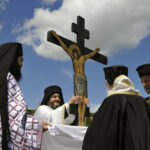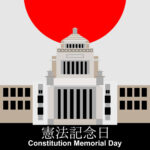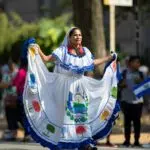Cross Day in El Salvador, also known as the Day of the Cross, is an annual holiday celebrated on May 3. On this day, families across El Salvador decorate a cross crafted from a jiote tree with paper decorations and fruit. It’s a colonial-era holiday that marks the start of the region’s rainy season. Salvadoran holidays and traditions blend religious observances with Indigenous and colonial traditions to celebrate the rich culture and beliefs of the Salvadoran people.
History of Cross Day (El Salvador)
El Salvador is a country rich in traditions and artistic celebrations. Like most of Latin America and the Caribbean, it’s a place of rich religious and cultural syncretism.Cross Day in El Salvador is celebrated in the country on May 3. It’s not an official or Church holiday, but it marks the start of the wet or rainy season with offerings of the season’s first fruits. Cross Day is a joyous occasion held in each house by individual families. However, some municipalities place their cross in front of the municipal park or the city hall. The festival is rooted in Byzantine Empress Saint Helena’s search for the cross Jesus died on, and the popular traditions associated with it almost certainly stem from pagan traditions brought to Spain by the Roman Empire.In classic prehistoric fashion, the Indigenous inhabitants offered food to thank the gods and Mother Earth for what they provided. The cross was added when the tradition merged with Catholicism during the colonial period. It is made of wood and embellished with flowers and long chains of vibrantly colored tissue paper. Salvadorans offer fruits, grains, vegetables, drinks, candies, and, sometimes, money at the foot of the cross. Visitors are also invited to bring offerings after kneeling in front of it and reciting a thanksgiving prayer.
Cross Day (El Salvador) timeline
El Salvador is discovered by Conquistador Pedro de Alvarado.
The Indigenous peoples resist the Spanish, but the Westerners eventually take control of the area.
The Province of Guatemala declares the Act of Independence of Central America.
Following government killings of protestors, the 12-year Salvadoran Civil War begins.
Cross Day (El Salvador) FAQs
What is El Salvador known for?
Thanks to its frequent earthquakes and many active volcanoes, the country is known as “the land of volcanoes.”
What is Holy Week in El Salvador?
Holy Week is a religious festival known as Semana Santa in the Spanish-speaking world, and it is celebrated with a carnival-like atmosphere throughout Latin America.
What is the climate of El Salvador?
The country has a tropical climate with moderate temperatures. Its wet season runs from May to October, while the dry season starts in November and ends in April.
Cross Day (El Salvador) Activities
-
Take a trip to El Salvador
Visit San Salvador to experience the festivities firsthand. It’s sure to be an exciting adventure that you won’t forget!
-
Place a cross in front of your house
Even if you can’t go to the country, you can still join Salvadorans as they place crosses on each house, either in the front yard or the back patio. The cross is typically made from jiote tree branches, which are common in El Salvador.
-
Try pupusas
Pupusas are stuffed tortillas that are uniquely El Salvadoran. They’re the country’s unofficial national dish! If you happen to be in El Salvador, treat yourself to meat- or cheese-stuffed pupusas.
5 Facts About El Salvador That You Didn’t Know
-
The surf hub
El Salvador is among the most prominent surfing destinations on the Pacific coast.
-
The land of volcanoes
The country has over 20 active volcanoes, with the most active erupting more than 20 times in the past decade.
-
Small but packed
El Salvador is a quaint but densely populated country.
-
First name basis
Most Salvadorans only address friends and family by their first names.
-
A hospitable country
El Salvador is famous for its friendly and welcoming atmosphere.
Why We Love Cross Day (El Salvador)
-
It celebrates spring
Cross Day commemorates the beginning of spring. It’s also observed to protect family members from the devil and to thank God for providing food.
-
It brings people together
Cross Day celebrates national pride and emphasizes the importance of community. We love how the festival combines both of these elements.
-
It honors Indigenous cultures
The holiday serves as a showcase for Indigenous art, theater, and music. It combines tradition and religion to honor Salvadorans, from the newest immigrants to the oldest residents.
Cross Day (El Salvador) dates
| Year | Date | Day |
|---|---|---|
| 2023 | May 3 | Wednesday |
| 2024 | May 3 | Friday |
| 2025 | May 3 | Saturday |
| 2026 | May 3 | Sunday |
| 2027 | May 3 | Monday |
































